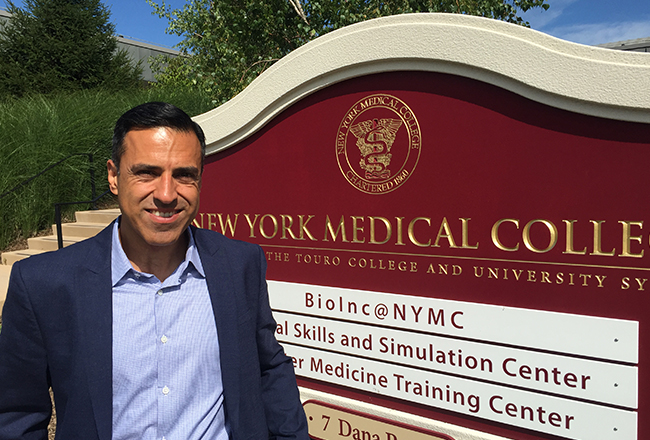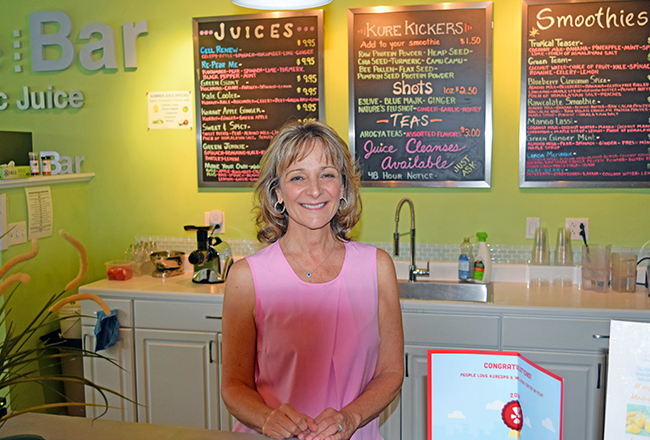
In 2014, Samant Virk was more than a decade into a career in private practice as a neurologist in Poughkeepsie, but he couldn”™t shake the feeling that something needed to change.
At his shared office space at New York Medical College”™s biotech incubator in Valhalla on July 31, Virk detailed the frustrations that led him to give up a career in medicine to launch his own tech startup, MediSprout. Over four years, his company has developed a platform for virtual doctor video visits it is now marketing to medical practices.
Before he launched the company, Virk said he felt a disconnect between medicine and the world around him. His office life didn”™t match his personal life made increasingly more convenient by technology: one-button ordering on Amazon and easy contact with friends and family through video chat.
“I”™d walk into my office and it felt like going back in time,” Virk said. “Patients had to come in for every appointment. Tons of inefficiencies in communication, daily fax machine rounds.”
He gave a statistic that, on average, 27 percent of a physician”™s time goes to actual patients, the rest spent doing paperwork, calling insurance companies and other administrative tasks.
That level of paperwork can leave a doctor feeling burnt out and, for Virk, he felt there had to be better way. He spent months describing his frustration with this disconnect and the ways he wanted to solve it, with his wife, Monica, before she finally had heard enough.
“She has an MBA and said ”˜I don”™t want to hear anything else, just write a business plan,”™” Virk said. “And that can be pervasive in the medical community. Doctors have tons of ideas, but nobody”™s acting on them. She said, ”˜Do something about it.”™”
Within a year, Virk stepped down from his private practice to launch a tech startup focused on connecting patients and doctors for virtual visits.
From that plan came MediSprout, incorporated by Virk in 2014. He has worked for the past four years with co-founder Randy Findley, who handles the company”™s tech, on developing a platform for patients to schedule video calls with their doctors in just a few clicks.
Virk stresses the doctor-driven nature of his app. The field of telemedicine is still relatively new and the laws and technology that govern it still under development. That provides a chance, he said, for doctors to make sure their interests are represented.
“There”™s a huge opportunity here for clinicians to set the tone,” Virk said. “Here”™s our moment to take this and say ”˜Here is how it”™s going to work.”™ If we don”™t jump on this opportunity, this could turn into the same mess we”™ve seen with so many solutions from secondary entities, which do things to benefit them, but patients and doctors get left out
in the cold.”
While there are competitors in the space ”” including Purchase-based Teladoc, which is publicly traded and owns about three-quarters of the telehealth market ”” MediSprout”™s corner of the market could come from its ability to appeal directly to doctors. Rather than having a large group of doctors ready to see patients on demand, MediSprout”™s focus is on providing a virtual option for patients to reach their doctors, and vice versa.
It”™s a good way for doctors to fill in unused time from canceled appointments, Virk said. Since scheduling is done on the app, it also eliminates the back-and-forth phone calls trying to find the right day and time. For patients, they can quickly reach their doctors and avoid traveling to the office for what could be a
quick consultation.
The ability to connect patients directly to their doctor was important to Virk, who described seeing a growing world of “outsourced medicine.”
“Patients were increasingly going to urgent care centers, they were going to doctors online they had never seen,” Virk said. “Meanwhile, I know my patients better than anybody. Why shouldn”™t I be their first line of care?”
MediSprout charges $4 per call, which can either be paid by the doctor”™s office or passed off to the patients, depending on the provider”™s preference. Doctors”™ offices also have a choice of adding an additional fee for the service.
MediSprout is already working with Mount Sinai Hospital. The New York City hospital includes the Susan and Leonard Feinstein Inflammatory Bowel Disease (IBD) Clinical Center, which uses MediSprout”™s app to help track follow-up care for complex IBD patients. MediSprout”™s app has been used about 700 times since summer 2016 by the center, the hospital estimated in a case study. The hospital believes that interacting with patients through the app could cut down on unnecessary hospital visits, which cost an estimated $50,000
per admission.
Under Virk”™s vision, a doctor should be able to jump online, set up an account and be ready to see patients through the app within 5 minutes. The company is focused now on improving its design while building up a base of doctors and users.
In a time of rapid change for the industry, Virk said it”™s important that health care providers don”™t lose track of the importance of their relationship with patients. That”™s something he hopes his app can help with by making it easy for the two parties to connect.
“We started with what I see as where health care begins,” Virk said. “If a doctor doesn”™t see a patient, nothing occurs. There”™s no prescriptions, no physical therapy, no X-rays. If we can make that better, we feel we can build an infrastructure where we can improve all of the things that result from that.”






















